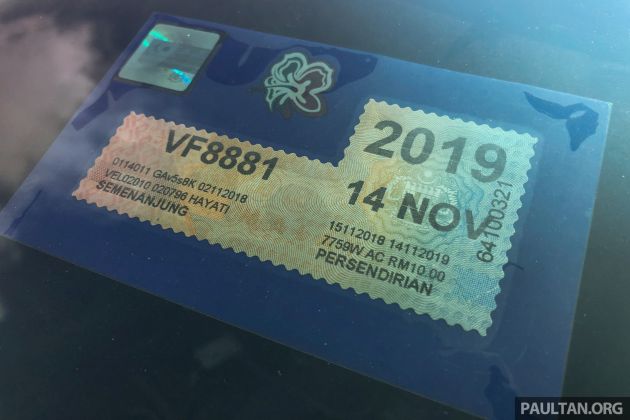It’s looking quite likely that owners of full-electric vehicles will be paying more for their vehicle’s road tax in the coming future, if what is apparently emerging is right. Word from the grapevine is that the road transport department (JPJ) will be moving to calculating the road tax rates for electric vehicles based on their motor kilowatt output instead of the traditional engine cc displacement as previously utilised.
This will effectively alter the payable road tax rate for EVs, which was initially drafted for calculation based on a kilowatt rate, and for which the table has been in place since 2011. According to JPJ sources, the rates for EVs were previously keyed in by clerks under the cc category during the vehicle registration, as a matter of familiarity. This is set to change.
A hint of the possible revision started last week, when a guideline on the calculation of the road tax for pure electric vehicles began to circulate around social media circles, with some thinking that this was a new, incoming rate. It turns out that it isn’t, and the document pages actually list the existing road tax rates for electric cars and motorbikes from before. But from what is being communicated, it seems that the switch will come about, although how soon remains to be seen.

Let’s take a look at how the switch to kW-based input would pan out, price-wise. For electric motorbikes (code AA), the road tax for such two-wheelers with an output rating of 7.5 kW and below will be set at a fixed rate of RM2.
For e-motorcycles with a motor output rated above 7.5 kW, the rate is calculated as:
For private saloon motorcars – individual (code AB) and company registration (AC) – with a rated output of 80 kW and below, the rates are as such:
Vehicles with a rated motor output of above 80 kW will have a base road tax applied as well as a progressive rate calculated into the final sum. The road tax rate is calculated as follows, starting with a base rate and an additional rate for each kW increase:
Given the dearth of fully-electric vehicles on the local scene presently, there won’t be much impact on some of the existing EVs on the road (such as the Nissan Leaf and Renault Zoe), but it will for something like the Tesla Model S, although users won’t feel the pinch directly, since they are leased and their road tax is covered under the terms of the leasing agreement.
Some calculations to get an idea of what the going rates will be with the supposed new scheme, if and when that comes about. The Zoe has a 65 kW (87 hp) output, so its ‘new’ EV road tax will be RM56. It currently pays RM28 in road tax based on the existing rate, according to a Zoe user.
The first-gen Leaf, which was introduced by Edaran Tan Chong Motor (ETCM) back in 2013, has an 80 kW motor, and will pay RM72 in road tax under the EV rate. The second-generation Leaf that is set to come to Malaysia later this year has a 110 kW motor, which means it would pay RM374 (RM274 base rate plus RM100 on the calculated increase from 100 kW) in road tax.
The cost jumps significantly with high output motors, with every kilowatt above 150 kW being charged RM27. The road tax for a Tesla Model S 85 presently is a rather insane RM10, based on a 7.75 kW output (we have no idea how that figure came about).
In any case, the new EV road tax rate for the base 270 kW (362 hp) S 85 version that was brought in will be RM4,264 (RM1,024 base rate plus RM3,240), while the S 70 RWD variant, which has a 235 kW (315 hp) output, will pay RM3,319 (RM1,024 base rate plus RM2,295).
Incoming cars like the Porsche Taycan, which has been confirmed for a 2020 arrival here, will also be paying a fair bit in road tax. With an output of 440 kW, the road tax for a base Taycan will be RM8,854 (RM1,024 base rate plus RM7,830 as scaled on the 290 kW difference from 150 kW), and likely higher for the Taycan 4S and Turbo variants. Of course, the sum doesn’t look like it will impact or affect any potential Taycan owners.
As it goes along, a trend may emerge with the electrification route in which where most of the activity will involve offerings up to the 150 kW region. Hybrids and plug-in hybrids (PHEV) will continue to pay road tax based on regular cc displacement for combustion engines, meaning there is no change no matter what kind of output their motors offer. What do you think of the eventual switch to the road tax for EVs? Share your thoughts with us in the comments section.
Related Cars for Sale on
Source: Read Full Article














